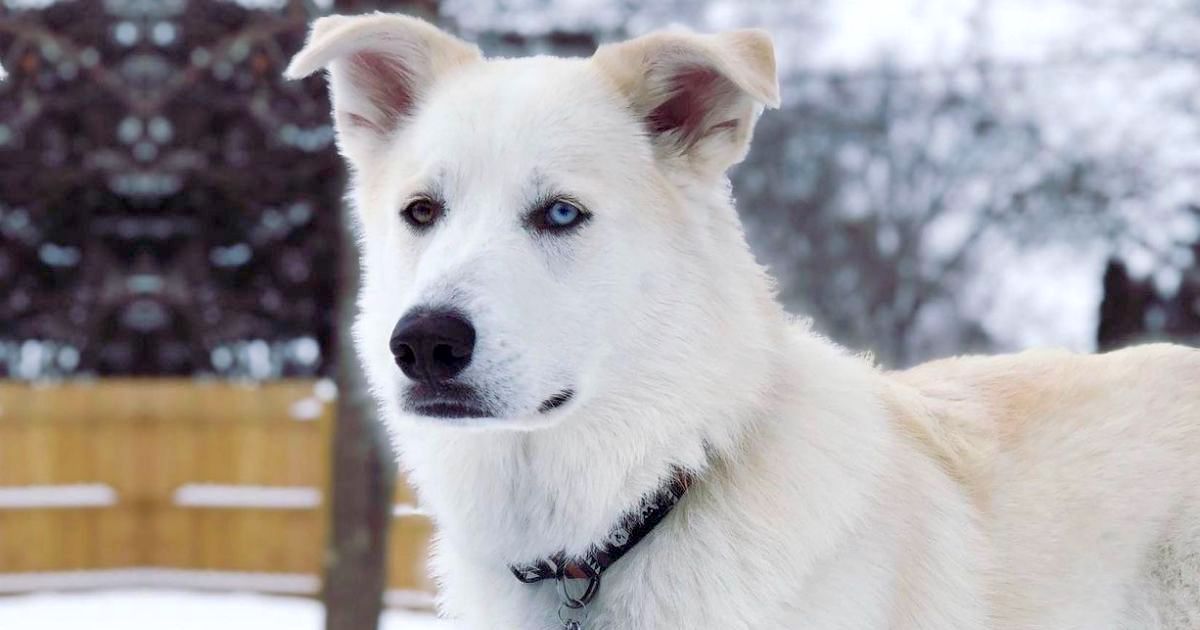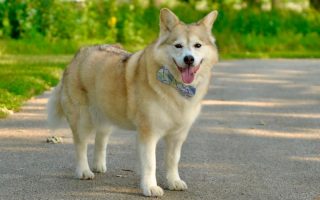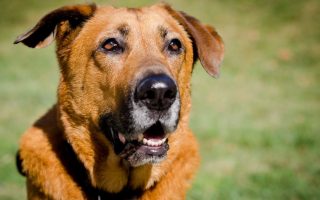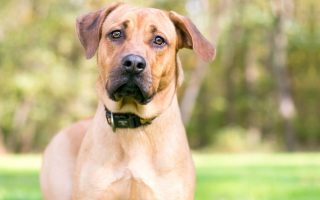The Great Pyrenees Husky mix is a designer breed that was obtained from a cross between the sledder Siberian Husky and the majestic Great Pyrenees.
It is also called a Pyrenees Husky or the Husky Great Pyrenees.
Like other designer breeds, not much is known about the specific origin of this breed but it possibly came about in the 20th century when designer breeds became the norm.
Although it has relatively famous parents, it is a rare mix in the United States.
Following the footsteps of its parents, this crossbreed is an active and intelligent breed that will need an active family with an owner who can handle its stubbornness.
It is a good worker, but also a playful companion for the right family.
In this ultimate guide, you will get to learn more about this strong designer breed.
We will cover all you need to know on Pyrenees Husky mix appearance, temperament, health conditions, and other facts and pro tips you will need.
Pyrenees Husky Mixed Breed Information
| Height | 18 to 22 inches |
| Weight | 75 to 100 pounds |
| Lifespan | 10 to 15 years |
| Coat | Thick, double, straight, medium |
| Colors | White, black, cream, multiple colors |
| Temperament | Independent, energetic, social, affectionate |
| Ideal For | Active families, experienced dog owners, homes with space |
| Puppy Price | $300–$600 |
Before You Buy a Great Pyrenees Mix Puppy
| Health | High |
| Grooming | Medium |
| Friendliness | High |
| Energy | High |
| Trainability | Medium |
The Parent Breeds
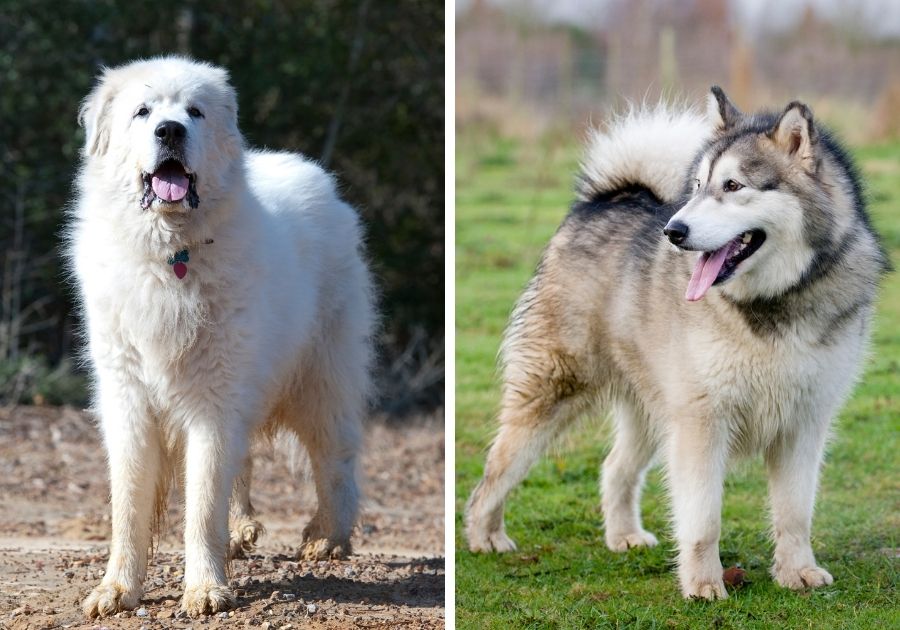
The Great Pyrenees
The Great Pyrenees originated from the Pyrenees mountains which fall between France and Spain.
It was developed to guard sheep. This breed has an ancestry that goes way back to eleven thousand years.
It is believed that the ancestors of this breed came to the Pyrenees Mountains around 3000 BC.
Further breeding brought about the breed we know today. It also goes by some other names like the Pyrenean Mountain Dog.
This breed came into the United States in the 1800s.
Both World Wars endangered this breed, but it was saved by some breeders. It was recognized by the American Kennel Club in 1933.
Despite its intimidating appearance and undeniable courage, the Great Pyrenees is not known to be an aggressive dog.
Although the Great Pyrenees is among the strongest dog breeds, aggressiveness is considered a flaw, not the norm. Rather, this breed is calm, gentle, and even docile.
That said, the Great Pyrenees is an independent dog that is used to thinking on its own. It may display some stubbornness during training.
The Great Pyrenees is quite big, with a weight that gets to 160 pounds and a height that is at 25 to 32 inches.
It has a double coat and is known as a heavy shedder. It has a muscular frame, black nose, and brown eyes.
Siberian Husky
The Siberian Husky originated in Siberia where it had the job of pulling a sled through the snow.
They used to work in packs of twos and threes, making this breed a pack dog.
It is believed that this breed was developed by a nomadic tribe known as the Chukchi.
This breed came into the United States via Alaska in 1908 during the gold rush.
It also participated in some doggy sports, including a dogsled race.
The Husky evolved in appearance in America from how it used to be when it was with the nomadic tribe.
In 1930, the American Kennel Club recognized this breed.
Siberian Huskies look a lot like wolves and have been used to play the role of wild wolves in many movies and shows.
One such show is the popular Game of Thrones where these dogs took the place of dire wolves.
They have erect ears, a double coat that shielded them from the harsh Siberian weather, and striking blue eyes.
They also weigh between 35 to 60 pounds with a height range of 20 to 23 inches.
This breed is friendly with everyone, including strangers. It makes a bad guard dog for this reason.
The Husky is stubborn to train though, perhaps more difficult than the Great Pyrenees.
Fascinating Facts About the Great Pyrenees Husky Mix You Should Know
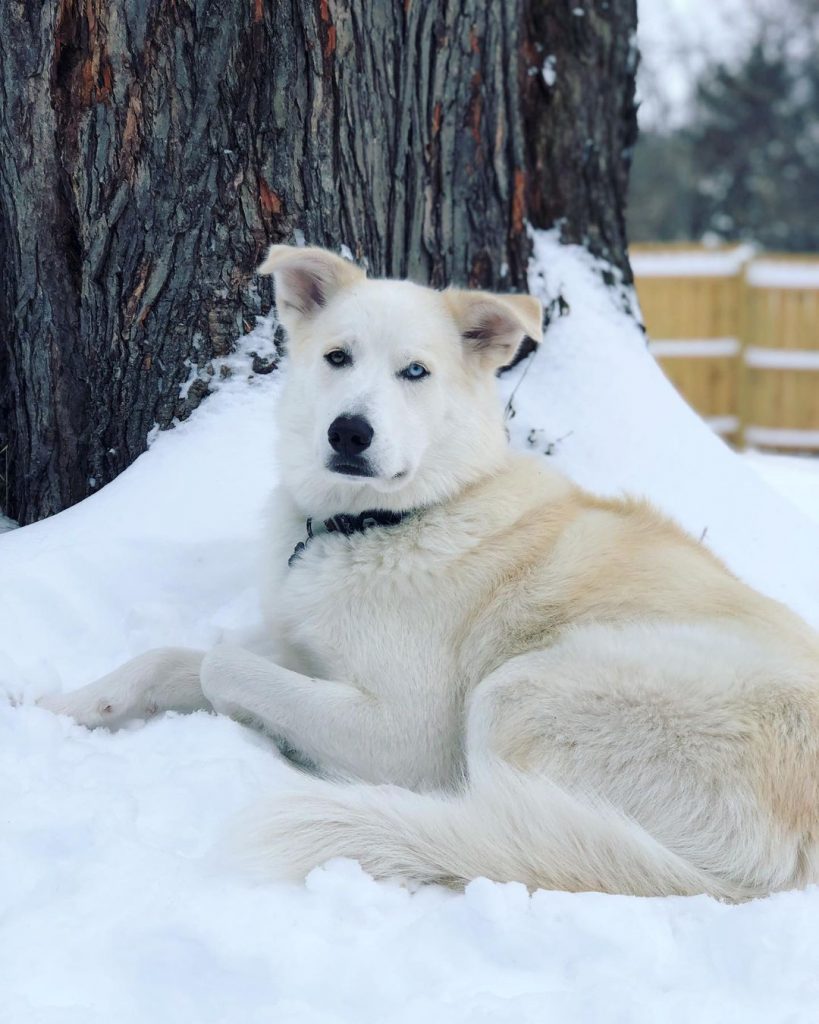
1. One parent is a very old breed
The Great Pyrenees is that parent.
As we’ve seen earlier on, its ancestry dates back to some millennia.
Even the Great Pyrenees as we know it today has been around for a long time.
As proof, fossils of this breed were found on the Pyrenean Mountain where it originated. The fossils dated to around 1800 to 1000 B.C.
Fortunately, it has survived for so long, even after its struggles after the World Wars.
It thrives to date and remains a favorite for many Americans.
Before this century, it was also a favorite of royalties. Queen Victoria of England is said to have owned one.
2. The Pyrenees Husky is a good therapy and rescue dog
This crossbreed plays the vital role of a therapy dog for people suffering from some mental illnesses like depression and anxiety.
It can perceive emotions, is friendly but calm enough to remain still when needed.
Add its affection and fluffiness to the equation and it shouldn’t be surprising that the mix is trained to be a therapy dog.
It is also good for rescue missions due to the courage and stamina it inherited from both parents.
3. It is a highly intelligent dog breed
The Great Pyrenees and the Siberian Husky are both intelligent dog breeds.
They played roles that required a level of independence and smart thinking.
Thus, they were developed to think on their own, solve problems and detect any possible dangers.
The offspring inherited these brains, so it is as intelligent as its parents, if not more.
This is both a blessing and a curse for you.
Intelligence makes a dog learn faster, but independence makes it unwilling to do things your way.
4. They need an active lifestyle and lots of care
Another attribute both parents of this mixed breed share is their love for work.
They were developed for activity and love being busy.
Though the Pyrenees is calmer than the Husky, both can’t thrive where there is nothing to do.
They also have coats that need significant care.
The parent breeds are both shedders, so be ready with a brush and a vacuum cleaner if you want your dog and your environment to remain clean.
The mix fits best in a family that loves regular exercise and the outdoors.
You should also be able to take care of a heavy shedder or have the means to employ someone to do so.
5. The are escape artists
If you plan to own this breed, make provision for a fence and a leash.
The fence has to be dug in and well erected to avoid your pet either digging through or jumping over and the leash will help keep it in place when outdoors.
Siberian Huskies are notorious for being escape artists, and many have gotten into trouble because of this.
Thus, you never know which parent gene will be dominant in the Mix, so it is best to be careful.
Appearance of a Great Pyrenees and Husky Mix
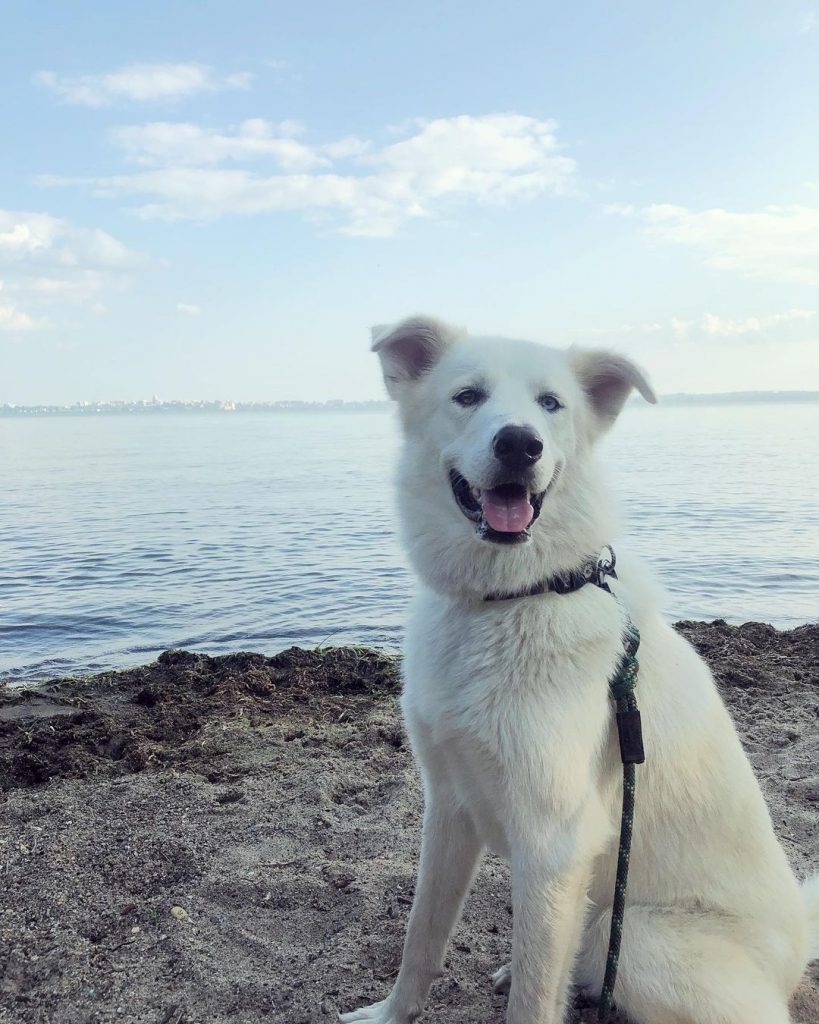
General Appearance
This mixed breed has parents with little similarities in appearance.
The way it looks is a genetic gamble. It may look like one parent or combine the features of both. Do not expect a standard appearance, however.
It may come with an erect, wolflike ear like the Siberian Husky or flabby ones like that of the Great Pyrenees.
Its eyes may either be Husky blue or Pyrenees brown.
The best way to predict what your mixed puppy will look like as an adult is by observing the dogs that were crossed to get this breed.
Size
The crossbreed is either medium or large, depending on which parent wins the genetic lottery in this aspect.
It is not uncommon to see a member of this breed looking different from the other.
Generally, these dogs weigh 75 to 100 pounds.
This weight range falls in between both parents, so don’t be surprised to find that some will weigh more than this.
Colors and Coat Type
The hybrid has a color range and often combines from both parents.
There are no standards, but the coat color is usually black, cream, white, or a mixture of some. Like both parents, this hybrid has a double coat.
The outer is often coarse, protecting the one softer within. Its coat can withstand harsh temperatures.
Temperament, Behavior & Intelligence of the Pyrenees Husky Mix
Like the appearance, the temperament of this mix may be more in line with a parent or turn out to be a combination of both parents.
That said, the parents have some behaviors in common. The chances of the offspring getting these traits are high.
Both parents are active, hardworking breeds, so the mix is better suitable for a home with work for it to do.
Though it may inherit the Great Pyrenees’ calmness to tamper with the Husky’s hyperactive nature, the mix isn’t suitable for an apartment building.
It is best for houses with space, preferably in the countryside where the weather isn’t hot.
If you don’t have work for this breed, provide activities that can challenge its body and mind.
Speaking of mind, the Pyrenees Husky mix is an intelligent breed that loves solving puzzles and learns with ease.
However, it isn’t a good first-time dog because of its independent spirit and stubbornness.
A novice will get frustrated and may not give this breed the necessary training it needs, thus encouraging behavioral problems.
The good news is, the breed is sociable with people but can defend its family against intruders because of the Great Pyrenees’ guardian instinct.
It is affectionate and loyal too, making it one of the most devoted mixes you will find.
Are Great Pyrenees and Husky Mixes Good Family Dogs?
The Mix has parents who have proven that they can be companions as much as workers.
They flow with children (though not suitable for a family with toddlers) and are affectionate buddies for adults.
The Mix is a good family dog with family-friendly traits of loyalty, love, and courage.
It isn’t for everyone, though. For some families, it may end up being a source of frustration.
Ensure that this crossbreed fits your lifestyle and level of experience before you get one.
Are They Good With Other Dogs and Pets?
The Siberian Husky is a pack dog, so it gets along with other dogs.
The Great Pyrenees is also known to associate well with other canines, especially when introduced from puppyhood.
So, the mix shouldn’t have any issue with canine buddies and may even want some.
However, with other pets, it is a bit complicated.
The Pyrenees flows well with cats and smaller pets because it has a low high prey drive.
The Husky, on the other hand, developed a high prey drive to survive the harsh Siberian environment.
You never know how the prey drive of the crossbreed will be, so socialize it from puppyhood if you want to keep it in a house with smaller pets. Be observant as well.
How Much Does a Great Pyrenees Husky Mix Puppy Cost?
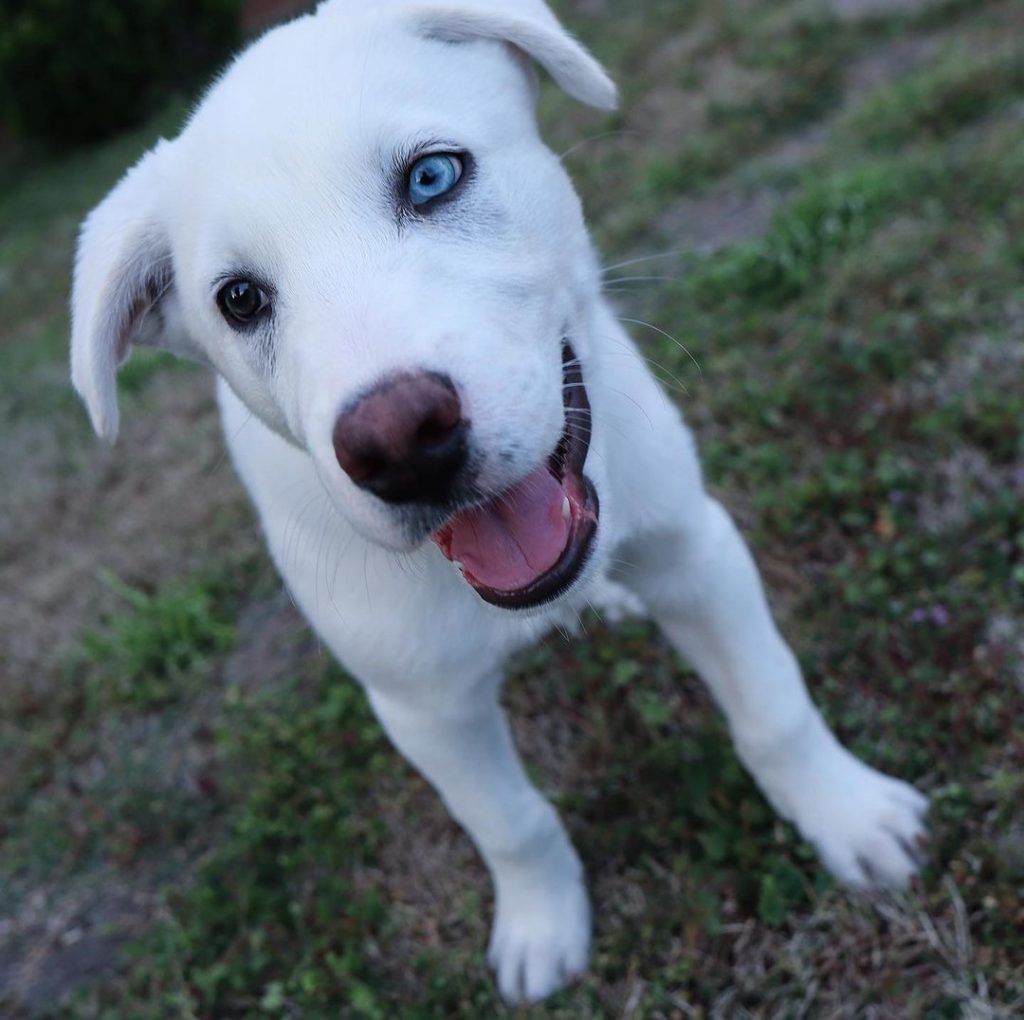
Contrary to its parents, the mix isn’t an expensive breed.
However, it is a rare one both in the United States and other countries in the western world.
It will take some time and effort to locate one. You may end up moving from your city to another to find a reputable breeder.
The price range if you want to buy a Pyrenees Husky mix pup is from $300 to $600.
That is more affordable than if you choose to get one of the parents.
The Siberian Husky costs around $600 to $1,300 while the Great Pyrenees falls within the price range of $1000 to $2500.
Though it is rare, you may still have problems with backyard breeders selling poorly bred pups.
Ask for relevant documents like the medical records of both parents. Do not be swayed by guarantees.
If you don’t want to buy, you may opt for adoption.
Rescue shelters with Huskies and Great Pyrenees may have this mixed breed in their litter.
Here, you should also ask questions and request the necessary documents.
Find out the previous home of the pup you are interested in and the circumstances that led to its arrival at the rescue shelter.
Caring for a Great Pyrenees Siberian Husky Mix
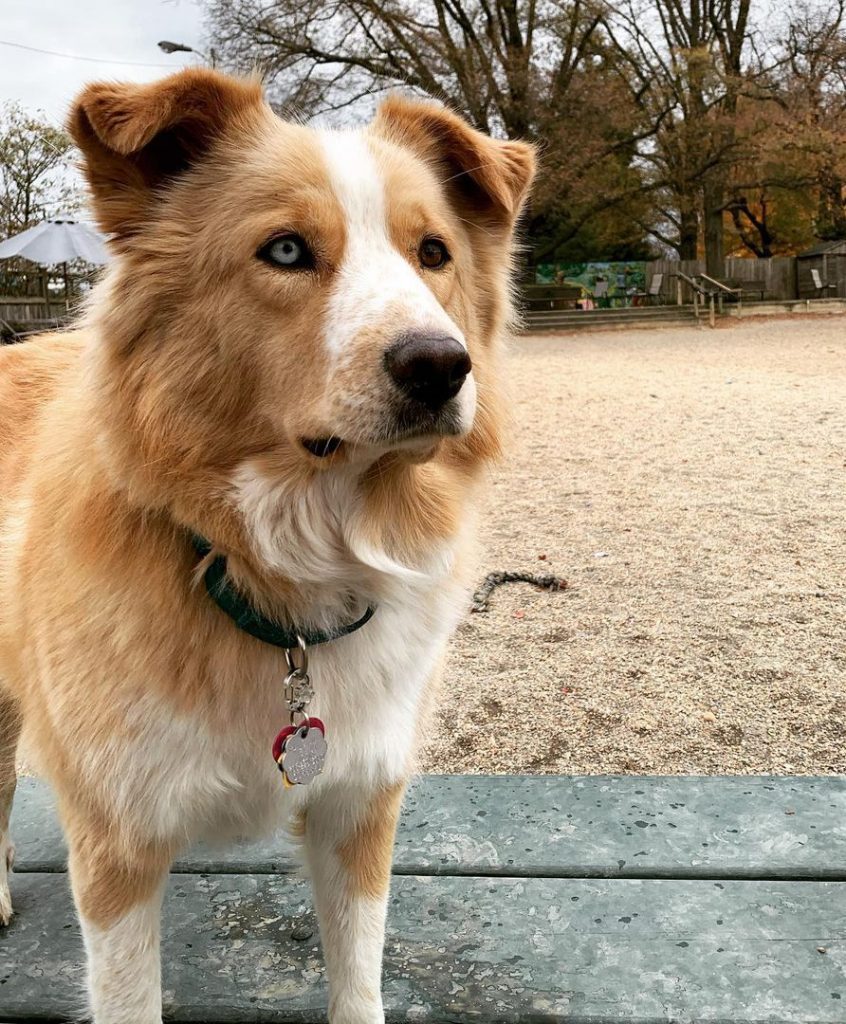
Food & Diet
Similar to other medium and large dog breeds, this mix needs a quality meal that can both satisfy and enrich.
It may be prone to obesity, so ensure it eats enough to maintain its energy without piling pounds.
The adult requires around two meals a day while the pup will need around three meals daily.
The size may vary, so consult a nutritionist or a veterinarian to help draft a feeding plan for your dog.
Its diet must also have the right nutrients. The most important is protein, and no doggy main meal should lack this nutrient.
For dogs, animal protein is the best kind, especially from chicken. You can supplement with some plant-based proteins as well.
Omega-3 fatty acids are another nutrient that is important for this hybrid. Fish is a good source of this fatty acid.
Your pup will also need some healthy fat and vegetables.
Other general canine feeding rules apply to this breed. There is some human food it shouldn’t eat and do not feed puppies the same food you give an adult dog.
Related:
Top 10 Best Dog Food For Huskies (Review & Feeding Chart)
Exercise
The next important need for this crossbreed is regular exercise. This is a defining factor that may disqualify some pet parents.
If your idea of a pet is a lazy couch pooch, do not go for a Siberian Husky mixed with Great Pyrenees.
Its energy level isn’t usually as high as a Husky because of the calmer Pyrenees, but it needs to be exercised daily.
These dogs need at least 45 minutes of exercise each day. Exercise should be both physical and mental to satisfy this highly intelligent and active breed.
For physical activities, a long walk can do the trick. Make sure it is on a leash while you walk.
Hiking is another favorable activity and a bonding moment for you and your pet.
This designer breed is a curious one who loves to explore. A hike across a great distance allows it to do so.
Related:
Hiking With Dogs: How Do I Prepare My Dog for Hiking?
It can also have some playtime in the safety of your yard. Games like fetch will keep your dog moving. The yard must be fenced to avoid your pet escaping.
Mental activities can include puzzles, hide and seek, and some training.
Challenge your dog’s mind so it won’t get bored and involved in destructive activities.
This crossbreed and its parents aren’t the easiest to train.
This is why first-time owners are advised to steer clear of the Great Pyrenees Siberian Husky mix.
You must be patient, firm, and consistent without giving in to frustration. With the right techniques, you will get results in no time.
Training should best begin when your pet is still a puppy and easier to handle.
At that point, start by teaching it that you are the alpha of the pack. Only then will you earn its respect.
Obedience training is essential for this strong-headed breed. Fortunately, it is smart enough to grasp commands with ease.
Let these commands be simple as no dog can comprehend lengthy words. Come, Sit, Roll are some good examples.
Once your pet has grasped the basic obedience training, socialize it.
You shouldn’t have much difficulty in this aspect as this breed is a social one and will get acquainted with ease.
While training, avoid the use of punitive measures like hitting or forceful isolation.
Harsh words and yelling are also unproductive methods of getting your pet in line.
Rebuke firmly but gently, and reward your pooch with treats and motivations when it does well.
Grooming Needs
It is also not so easy to groom this breed, but you can do it by yourself if you have the experience, time, and interest.
If not, then hire the services of a reputable groomer. It takes effort to do this job and not everyone has the ability or willingness to.
This hybrid has the double coat of both parents, which requires weekly brushing to remove dead hair and forestall matting.
During shedding seasons, brush the coat daily to clear off the dead hairs. You can also get the dog to a groomer to give it a blowout.
Ear cleaning is essential, especially if your dog inherited the floppy ears of the Great Pyrenees.
Dogs with these ears are more vulnerable to ear infections and require extra treatment.
Also keep in mind other forms of hygiene like nail cleaning, eye cleaning, and brushing of teeth.
Health & Conditions
Designer breeds have the advantage of better health than purebred canines.
The same applies to this hybrid. With good care, the Great Pyrenees Husky mix can live up to 15 years.
However, some illnesses might be passed down from the parents, which you should watch out for. They include:
- Bloat: Bloating is a serious medical condition that could lead to your dog’s death. It occurs when the stomach fills up with water, food, and other fluids and swells.
- Eye Deficiencies: Many eye conditions affect both parents of this Mix. Cataracts and Progressive Retinal Atrophy are good examples.
- Hip Dysplasia: Hip dysplasia is an inherited, common illness that affects a dog’s hip and affects mobility.
How big do Great Pyrenees Husky Mix get?
The Pyrenees Husky can both be medium or large. Usually, it falls between both parents. It weighs up to 100 pounds (sometimes more) and grows up to 22 inches.
How long do Great Pyrenees Husky mixes live?
As a designer breed, the Pyrenees Husky mix has a long life span. With good care, it can live up to 15 years.
Final Thoughts
The Great Pyrenees Husky Mix is not a dog that you will find everywhere. It shouldn’t be one that should be everywhere, even.
Only certain people can handle this breed, and you must ensure that you can before you venture into it.
Pet parenting is fun, but also serious business.
However, with the guide in this article, you sure have all the information you require to get started.
Other Mixes You May Also Like:

